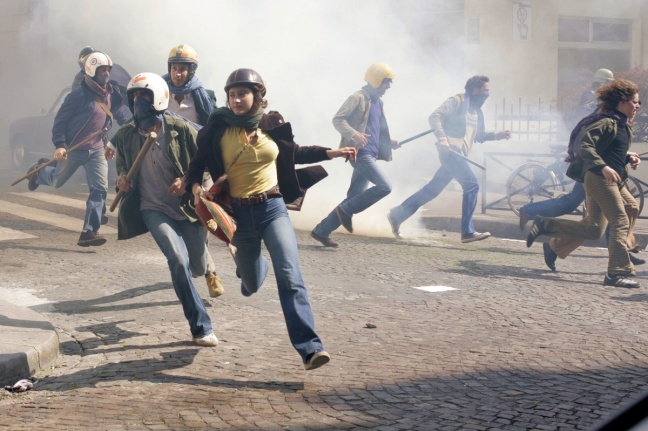The English-language title of this new film scripted and directed by Olivier Assayas is an example of how far English titling (and subtitling of dialogue) can stray from the original. The ’After May’ of the French title refers to ‘after May 1968’ as we follow the adventures and loves of a group of French teenage school radicals in the 1970s. In fact the English language title is not that inappropriate, as Assayas’s partly autobiographical film is much more about feeling than politics. Jonathan Romney reviewing the film in the June issue of Sight & Sound includes a quote from Flaubert with his own comment:
“’That was the best thing we ever had.” In Flaubert’s novel, these words carry a bitter charge, as Frédéric has failed to understand the historic urgency of the times he’s sleepwalked through. By contrast Assayas’s student hero (and counterpart) Gilles very consciously lives his epoch to the full, in all its complexity and contradictions.” Giles and his companions may have been aware of the complexities and contradictions but this is not apparent to viewers who did not live through or have not studied that period.
At various stages there are scenes that feature Communists (from the French CP), several different Trotskyist and Maoist tendencies, Anarchists and Situationists. None of these have their politics defined. I was, though, not surprised that the treatment spent a little more screen time on a book by a CIA plant attacking The Cultural Revolution. And we never see clearly the content of slogans and leaflets. In a scene that would seem typical in a Hollywood film a lecturer introduces a discussion of Karl Marx and Frederick Engels’ The German Ideology, but the scene ends just as the explanations begin. In fact Assayas seems to have much clearer memories of the art, culture and especially sex of the period. This repeats the approach that Assayas bought to his earlier film (and television mini-series) Carlos (2010), However, whilst we get substantial chunks of art and culture (Booker T. Gregory Corso, Malevich, …) the sexual activity is far more coy. I think there are only two complete frontal nude shots in the film (one penis and one vagina), and on both occasions it is a model for an artists or art students.
Given Assayas graduated into film it is revealing that the longest discussion of radical approaches concerns ‘revolutionary syntax’ in cinema. However, that is not a style that is used to present the story, which relies on the conventions of Art Cinema, with long takes and some impressive crane shots. Some of the tropes and motifs may well be ironic. But that did not seem to be the case with the film extracts we see. One of these is The People’s Courage (El coraje del pueblo, 1971) by Jorġe Sanjines & Grupo Ukamau. This is one of the key Latin American films that manages to combine both a ‘revolutionary syntax’ with revolutionary content, “instruments of the people.” It unfortunately has not left its mark on Assayas’ own cinema.
This is a very well produced and directed film. It looks good and sounds good. The cast is generally excellent and convincing. It is certainly a treasure trove of nostalgic items. To be fair it also captures some of the milieu of the period, but not the politics. I was absorbed in the film but increasingly irritated by the latter aspect. ’68 has not been that well served by recent cinema. This film has more space for politics that Bertolucci’s The Dreamers (2003), but certainly not greater depth. For me Philippe Garrel’s Les Amants réguliers (2004) is till the best recent treatment of those heady times.
The film is a 2011 French production. The cinematography was by Eric Gautier, Art Direction by François-Renaud Labarthe and Sound by Nicolas Cantin.

